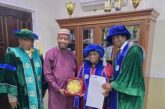
Temitope Ogunsanwo, who bagged first-class honours with a cumulative grade point average of 4.82 and emerged as the best-graduating student in the Faculty of Law at the Obafemi Awolowo University, Ile-Ife, shares her motivation and aspiration with EMMANUEL OJO
How easy or difficult would you say bagging first-class honours in Law was?
First of all, I will say that it is God manifesting because sometimes I ask myself how I did it. God crowned all of my efforts with success because I got to the university with the mindset to strive for excellence and I am working hard at that, and achieving this is like a pat on my back that I have done so well.
I will not say it was easy coming out with a first-class (degree) and graduating as the overall best student. It involved a lot of effort, time, and putting myself through stress intentionally, where I had to do certain things that could have been avoided because I decided to pursue excellence in my academics. I also cut off from a lot of social activities. I missed out on many extracurricular activities at some points during examinations and I did a lot of late-night reading. There were instances when I felt that I worked hard enough and maybe the point (grade point average) I got probably did not show the hard work but I persevered through that. So, I think part of the process was to have the resilience to get past challenges that I faced in the course of my academic journey.
What benefits would you say you got from cutting off social activities?
I think a lot of people would say they can do both – they can be the social butterfly and at the same time, do excellently in their academic work – and I think that to a very large extent, that is possible by planning the day better and having a good time management ability. That helps to be able to get into social activities and still be able to study. However, for me, cutting down on these helped me to have much time to prepare my notes because I was a student who liked to prepare my notes, which involved combining class notes with textbooks and notes from senior colleagues and that took a lot of time rather than just reading straight from textbooks. I had to prepare my notes and because I cut down on all of that (social activities), that really helped me because I realised that it was the pattern that worked for me.
How did your friends perceive the anti-social lifestyle you adopted?
I think my colleagues were super supportive. I don’t think I got any negative energy from them because of that. I still got invites from people to attend their events. I think in my final year, I put in more effort to associate with my colleagues because those were the last days in the university. At some point, when they saw me at a gathering or an event, they were surprised that I could attend but throughout my academic journey from part one to part four, they were super supportive and I think I had friends who were not social butterflies too, so, we had this clique where we knew that we weren’t going to attend social gatherings and we were cool with that.
Did you experience any pressure from peers for not attending social events?
I think you can only get pressure when maybe the people around you are pressuring you and my friends were people who didn’t like going out much. I think I am also an introvert and did not have so much excitement going out. That was how I was able to deal with that and my personality didn’t make me get pressured in that way.
Do you keep a large or small circle of friends?
I can count the number of friends that I have but I have acquaintances too.
Do you think graduating as the overall best student was something many expected?
I would say that no one would be overly surprised that I emerged as the best-graduating student because, at some point, one would figure out that with my results, it was possible that it could happen. So, it was in part four that the speculation began. Even some of my friends joked about it and called me the best-graduating student. A few days before the convocation, the brochure of the university was released where my name was written as the best graduating student and the moment I saw the brochure, I was excited. I didn’t even know when I started crying even though I knew that it was a possibility but the fact that it became a reality was so surprising and very overwhelming for me and I just gave thanks to God who helped me from the first day in Obafemi Awolowo University, till my final exams and when I emerged as the best-graduating student in the Faculty of Law.
What was your cumulative grade point average?
It was 4.82 out of 5.0 and I am the best-graduating student with the highest CGPA ever recorded in the Faculty of Law at Obafemi Awolowo University.
Were there things you did differently that stood you out academically?
I think that it is first of all the God factor because if I didn’t have the favour of God, it wouldn’t have worked out. My name is Favour, so, my name worked for me to a large extent. But to study law, there are three things I find to be very important. You have to understand yourself, you have to understand the law and you have to understand your lecturers. Understanding yourself means understanding what works for you, so, I understood what worked for me. Understanding means to read and understand what you are reading. There were situations when I didn’t understand what I was reading and I had to ask questions. For me, I reached out to my senior colleagues when I didn’t understand that and in my first year, I checked online for things that I didn’t understand. Understanding the lecturers is also important for me. I had to understand what my lecturers wanted when answering their questions and I achieved that by attending classes and listening to my lecturers. There is hardly any lecturer who wouldn’t give a hint as to how he wants you to answer his questions in an exam hall.
To what extent did your parents influence your education?
I think they influenced my education to a large extent and the most obvious way was by providing financial stability for me to be able to concentrate on my studies. I don’t think I would have been able to cut off from social activities and a lot of activities if I was not financially stable enough to be able to do all of that. Also, they advised me and prayed for me, and the emotional support was very influential in my academic success.
Are any of your parents a lawyer?
My dad is a retired Commissioner of Police.
Did he influence your decision?
I don’t think he influenced me to study Law. I used to tell people that initially, I wanted to become a doctor because he (my dad) is a doctor but after going through science and arts courses in Senior Secondary School 1, I realised that I was better in the art class and I stuck with it and when it got to the point of deciding what course to study, Law was a no-brainer because it was just the core course in the art class. I think I also chose Law because I was surrounded by people who I would say enforce the law. So, just as a child, I had that embedded in my mind, so, I got curious about it and found out more about it, and studied Law. I don’t think I can particularly say that studying Law was my childhood dream. As I said, I wanted to be a doctor but that didn’t work out.
What would you describe as your most challenging moment on campus?
I think my most challenging moment would be when I had to take exams while in sick bed and it was so difficult because I was down throughout the examination period. I could not get out of my bed and I just laid down to read my books because I knew failure was not an option and if I didn’t take the exams that semester, I would have had to stay back for one year. So, trying to read during that period was probably one of the most challenging but I just kept on going.
Also, in my final year, I combined my final paper with a fellowship in venture capital at the university. So, I had to complete all the projects that were given to me during the fellowship at the same time that I had to take my examinations. So, combining pursuits with professional experience and my academic work seemed very challenging but how I was able to persevere through that was serious time management.
Did you have people you looked up to in the legal profession while studying at the university?
Yes, I think that is one thing Obafemi Awolowo University has begun. You can find mentors that will be instrumental to your success. In my first year, I remember attending a session and I think it was called a mentoring session with Samuel; I really cannot remember his surname now but there, he said something. We were all freshmen at that time. He told us to sit down and just imagine ourselves being called out as first-class students on that day. So, basically, having someone to make me envision myself being the best-graduating student from part one was just amazing and because I had that imagination, I kept that feeling in my heart and that was something that fuelled my decision to kind of focus on my academic work and I also had other mentors from senior colleagues, like Damilare Disu, Alex Ifechukwu. They were people I called when I was stuck on a particular topic when I didn’t understand it or when I couldn’t figure out where to apply for an internship. Basically, I had mentors. I also had mentors who were senior lawyers too who told me how important it was to focus on my academic work and how the long-term benefit could not be overemphasised.
What was the worst grade you had at the university?
I had a C in one of my courses in part two.
How did that make you feel?
I was sad and wondered how I could have had that, but it made me sit up and read more. For me, whenever I have a setback, it’s just a way of God telling me that He is still the one guiding me and that I should not be too proud. So, it’s just a reminder that as much as I know what I am doing, I should not be so proud that I become lazy. So, it was a call to sit up, a call to assess my situation.
In public universities, there is a common perception that some lecturers are sadists because of the poor grades they award to students. Did you experience any of such?
Even if that happens, many lecturers, or at least two, teach a particular course, especially in Law. So, if one lecturer behaves that way, there are other lecturers who would probably give you what you worked for. So, you can use whatever score you get from the other lecturers to balance out such. I think lecturers in the Faculty of Law at OAU give students what they worked for.
What type of childhood did you have?
My childhood was like that of a typical Yoruba child. I am from Ogun State and I grew up with parents who inculcated the Yoruba culture in me with things like having respect for elders, which I always did. I have three siblings and I am the third child. So, I had two older siblings and a younger one and I think my older sister influenced me to be serious with my academic work because she was very serious in secondary school and she won all the prizes, so, teachers always challenged me to be as brilliant as my sister and I hated hearing that. So, because of the comparison between me and my sister, I worked hard to follow in her footsteps and I think that that helped me. I think my childhood and training from my parents helped me to become a more responsible child and that influenced my academic life. I think my most cherished childhood experience would be dancing in the living room with my dad.
Does that mean you have always been A grade person from primary school?
I think it has been a mix. I remember getting good grades and not getting good grades in primary school. It’s been a mix but in senior secondary, I got more serious and more consistent, and I graduated as the best pupil. So, I had that mindset of trying to beat my records. So, I’m not competing with other people but with myself. When I got to the university, I realised that being the best pupil in secondary school does not imply that one would necessarily be good because the level of hard work for excellence required in the university is a lot more than what is required in secondary school and I am happy that I was able to do that at the university.
Having bagged a first-class degree in Law, what is next for you?
I was having a conversation with a friend that when people say school is a scam, it is actually not because having good grades does end up paving the way for one both in Nigeria and globally and I have seen that with what my senior colleagues have done when they get scholarships to study graduate courses in different universities around the world, and getting jobs even without a master’s degree. So, with my first-class (degree) in law, that could also be my story where I get an opportunity globally and I would eventually be able to contribute my quota to the profession in Nigeria and around the world.
Credit: Punch




